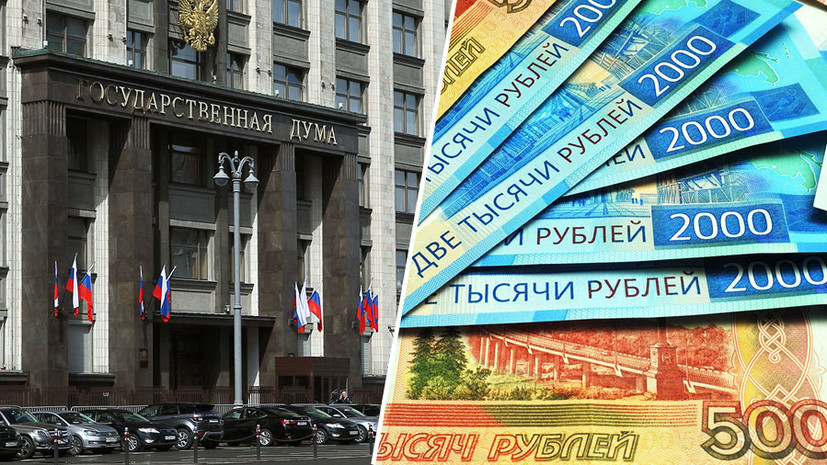From January 1, 2023, the minimum wage (minimum wage) in Russia will increase by 6.3% - from 15,279 to 16,242 rubles.
The corresponding law on Wednesday, December 7, was adopted by the State Duma in the third, final reading.
“In addition, the law proposes to change the procedure for calculating the minimum wage for 2023 and 2024.
The minimum wage will increase in an accelerated manner: its increase will depend on the growth rate of the subsistence minimum (PM) of the able-bodied population in the whole of the Russian Federation and will exceed them by three percentage points, ”the lower house of parliament said.
So, from January 1, 2023, the living wage for able-bodied Russians will be indexed by 3.3% - from 15,172 to 15,669 rubles.
The law on this was signed by President Vladimir Putin on December 5.
According to the document, per capita PM will be 14,375 rubles, for pensioners - 12,363 rubles, and for children - 13,944 rubles.
Recall that the minimum wage sets the minimum wage that a full-time employee can receive.
In addition, the indicator is used to calculate benefits for temporary disability, as well as for pregnancy and childbirth.
The living wage, in turn, is used to assess the needs of citizens when providing such state support measures as monthly payments to low-income families with children.
Since June 1, the minimum wage and PM have already been increased by 10% due to sharply increased inflation in the first half of 2022.
Thus, the re-indexation of indicators from January 1 will partly compensate citizens for the rise in consumer prices, according to the Ministry of Labor and Social Protection.
“The aggregate growth rate of basic social guarantees will be higher than the projected inflation of 12.4%.
The total annual growth of the subsistence minimum will be 13.6%, and the minimum wage - 16.9%," Labor Minister Anton Kotyakov said in September.
Earlier, Vladimir Putin instructed the government to prepare additional proposals for the accelerated growth of the minimum wage and increase its gap from the subsistence minimum.
This, according to the head of state, will make the budgets of Russian families more sustainable.
“It is important that the incomes of citizens, especially families with children, grow at a rate higher than inflation.
We really, I want to emphasize this again, according to all experts and the government, the downward trend in inflation is stable, and experts believe that somewhere in the first quarter of next year it should approach somewhere around 5%, maybe even a little less.
We need salaries to outpace price increases, ”the Russian leader emphasized.
RIA News
© Mikhail Metzel
Note that in accordance with the Constitution of Russia, the minimum wage cannot be less than the subsistence minimum.
According to the plans of the authorities, in the future the difference between these two indicators should exceed 30%.
“In the federal budget for the next three years, the growth rate of the minimum wage is set above the growth of the subsistence minimum, and at the end of the three-year period, we expect the difference to reach 10%.
This, of course, is not enough.
We plan to continue this work in order to consistently achieve the target,” Anton Kotyakov said.
As Svetlana Bessarab, a member of the State Duma Committee on Labor, Social Policy and Veterans Affairs, told RT, the planned indexation of the minimum wage will increase salaries, most benefits and a number of financial benefits.
At the same time, the authorities will continue to rapidly increase material support for citizens until they are sure that the situation with inflation has completely stabilized, the deputy stressed.
“The state is working to increase benefits, social payments and is trying to quickly protect the population from falling incomes.
If earlier in the 1990s all the problems fell on the shoulders of the Russians, and they were forced to cope with difficulties on their own, this is not happening now.
The indexation of payments above the inflation rate is precisely aimed at preventing an increase in the level of poverty, albeit with a slight increase in the burden on the budget,” Bessarab added.
According to the estimates of the State Duma, in 2023 more than a third of the Russian budget is planned to be directed to social spending.
Moreover, over the next three years, the expenditures of the state treasury will continuously exceed the volume of income.
However, the country's leadership has the resources to compensate for expenses, says Alexander Abramov, head of the laboratory for the analysis of institutions and financial markets at the Institute for Applied Economic Research of the RANEPA.
“The budget deficit will be all three years, but the authorities will cover the lack of funds through mainly domestic borrowing.
We are talking about the placement of government securities on the market.
If suddenly these volumes are not enough, then reserves from the National Welfare Fund can always be used, ”concluded Abramov.

